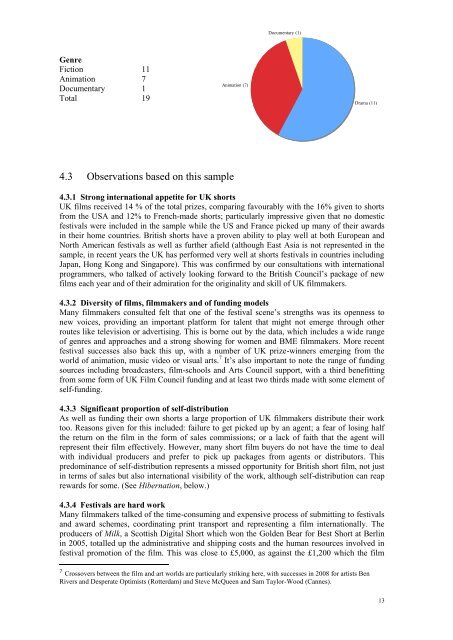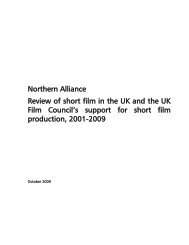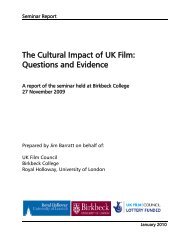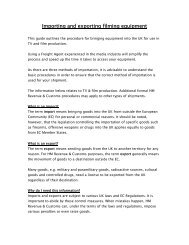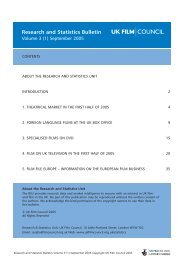Short Film Export Report - BFI
Short Film Export Report - BFI
Short Film Export Report - BFI
Create successful ePaper yourself
Turn your PDF publications into a flip-book with our unique Google optimized e-Paper software.
Genre<br />
Fiction 11<br />
Animation 7<br />
Documentary 1<br />
Total 19<br />
4.3 Observations based on this sample<br />
Animation (7)<br />
Documentary (1)<br />
4.3.1 Strong international appetite for UK shorts<br />
UK films received 14 % of the total prizes, comparing favourably with the 16% given to shorts<br />
from the USA and 12% to French-made shorts; particularly impressive given that no domestic<br />
festivals were included in the sample while the US and France picked up many of their awards<br />
in their home countries. British shorts have a proven ability to play well at both European and<br />
North American festivals as well as further afield (although East Asia is not represented in the<br />
sample, in recent years the UK has performed very well at shorts festivals in countries including<br />
Japan, Hong Kong and Singapore). This was confirmed by our consultations with international<br />
programmers, who talked of actively looking forward to the British Council‟s package of new<br />
films each year and of their admiration for the originality and skill of UK filmmakers.<br />
4.3.2 Diversity of films, filmmakers and of funding models<br />
Many filmmakers consulted felt that one of the festival scene‟s strengths was its openness to<br />
new voices, providing an important platform for talent that might not emerge through other<br />
routes like television or advertising. This is borne out by the data, which includes a wide range<br />
of genres and approaches and a strong showing for women and BME filmmakers. More recent<br />
festival successes also back this up, with a number of UK prize-winners emerging from the<br />
world of animation, music video or visual arts. 7 It‟s also important to note the range of funding<br />
sources including broadcasters, film-schools and Arts Council support, with a third benefitting<br />
from some form of UK <strong>Film</strong> Council funding and at least two thirds made with some element of<br />
self-funding.<br />
4.3.3 Significant proportion of self-distribution<br />
As well as funding their own shorts a large proportion of UK filmmakers distribute their work<br />
too. Reasons given for this included: failure to get picked up by an agent; a fear of losing half<br />
the return on the film in the form of sales commissions; or a lack of faith that the agent will<br />
represent their film effectively. However, many short film buyers do not have the time to deal<br />
with individual producers and prefer to pick up packages from agents or distributors. This<br />
predominance of self-distribution represents a missed opportunity for British short film, not just<br />
in terms of sales but also international visibility of the work, although self-distribution can reap<br />
rewards for some. (See Hibernation, below.)<br />
4.3.4 Festivals are hard work<br />
Many filmmakers talked of the time-consuming and expensive process of submitting to festivals<br />
and award schemes, coordinating print transport and representing a film internationally. The<br />
producers of Milk, a Scottish Digital <strong>Short</strong> which won the Golden Bear for Best <strong>Short</strong> at Berlin<br />
in 2005, totalled up the administrative and shipping costs and the human resources involved in<br />
festival promotion of the film. This was close to £5,000, as against the £1,200 which the film<br />
7 Crossovers between the film and art worlds are particularly striking here, with successes in 2008 for artists Ben<br />
Rivers and Desperate Optimists (Rotterdam) and Steve McQueen and Sam Taylor-Wood (Cannes).<br />
Drama (11)<br />
13


